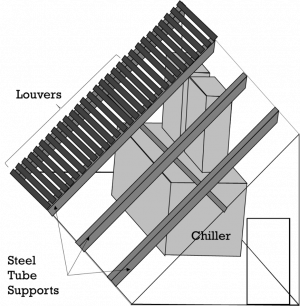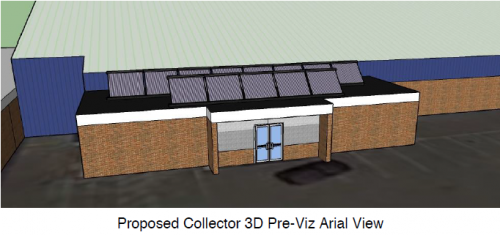Are you interested in exploring clean heating and cooling opportunities in your municipal buildings? MAPC can help!
Communities, residents, and businesses are learning how to keep building occupants comfortable and climate-friendly using clean heating and cooling technologies. Clean heating and cooling (CH&C) technologies such as solar thermal and high-efficiency heat pumps reduce the role of traditional heating fuels, often decreasing cost and the emissions associated with their combustion. There is significant opportunity and need to offset traditional heating fuels in Massachusetts buildings, which has prompted the Commonwealth to roll out a range of incentives, from the Massachusetts Clean Energy Center’s (MassCEC) clean heating and cooling rebate programs to the Massachusetts Alternative Portfolio Standard incentive.
MAPC is finding ways to more easily bring these technologies to municipalities in the region. Later this year, MAPC will release a white paper to help communities better understand available CH&C technologies, incentives, supporting policies, and pathways for installation. MAPC, in partnership with Meister Consultants Group, has also taken steps to collectively procure solar hot water technologies for a few communities through a pilot program funded by MassCEC’s Solar Thermal Challenge.
The Solar Thermal Challenge
The MassCEC Solar Thermal Challenge program seeks to expand the market for solar thermal in Massachusetts through a series of pilot installations. MassCEC offers grants both for solar thermal feasibility studies and installations that have been underutilized with the relative outpacing of PV systems.

The overarching Solar Hot Water Outreach program features pilot solar thermal programs and outreach for each of three target sectors; residential, commercial and industrial (C&I), and municipal. The solar thermal market is currently made up of relatively small and local companies in Massachusetts at the moment. Through these pilots, MassCEC and their project partners will collect best practices for all sectors and develop case studies and tools to make these models replicable across the Commonwealth.
From Feasibility to Installation
MAPC surveyed our communities to see which would be interested in installing solar thermal systems on municipal buildings. After our initial research on the topic, we determined that the most feasible buildings would need to have
(1) High hot water use,
(2) Consistent hot water needs throughout the day, and
(3) At least some hot water use year-round, since the summer demand can be a big factor in sizing the system. There are also some surprising use cases for solar thermal, like the ice skating rink in Winthrop, which turned out to have significant hot water use from the Zamboni and shower facilities.
Upon completion of market research, MAPC split the solar thermal procurement into two separate procurements; a Request for Proposals (RFP) for feasibility studies and an Invitation for Bids (IFB) for installation. This approach served to make it easier for a wider range of vendors to bid, and to give municipalities a better idea of which sites would be economically feasible.
For the feasibility study RFP, MAPC included a requirement to apply for the MassCEC feasibility study grant on behalf of the municipalities, and to conduct at least one week of water metering on site. The latter requirement proved to be useful during the selection process to determine the capacity of the vendors to conduct studies at multiple sites within the time frame.

MAPC has just launched an Invitation for Bids for installation for sites in Chelsea and Winthrop. Based on our preparation for this procurement, MAPC would recommend communities require a pre-bid walk-through of the facilities for vendors to measure and see the space, a narrative on the choice of equipment, and a plan for the installation of storage tanks and plumbing. A main difference between photovoltaic projects and solar thermal projects is in the location of the components other than the collectors (the devices that capture and distribute the heat). It is worth putting thought into what space is available for this equipment within a facility and having vendors speak to someone familiar with the space.
What’s Next?
MAPC will be opening bids from the installation IFB in mid-April, and choosing a vendor shortly after. If you are interested in exploring clean heating and cooling opportunities in your municipal buildings, tune in to our second webinar on May 9th at 12:00PM to hear more about procurement pathways for solar thermal systems and lessons learned during the pilot. Click here to register.

Learn More
